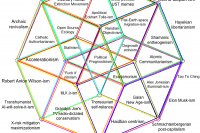“Politics is the mind-killer.”
— Eliezer Yudkowsky
Your mind is similar to a computer.
Your brain is the hardware, your worldview the software.
The operating system you’re running is heavily influenced by your culture, upbringing, education, and many other factors.
Arguably, a well-functioning mind is a mind that can update its operating system.
As new information comes in, a healthy mind will revise its previous conclusions about the world to account for the new data.
The smartest people in the world do this: They’re constantly reading, tinkering, experimenting, and in the process updating their understanding of the world.
After all, the more accurate your models are, the better decisions you’ll make, and the more success you’ll have.
This holds true in virtually every area of life. As the renowned economist John Maynard Keynes put it:
“When my information changes, I alter my conclusions. What do you do, sir?”
Dogma as Malware
Armed with this understanding, we can see that an unhealthy mind is a mind that does not or cannot update itself.
Instead of expanding and revising its models to reflect new information, it will warp and misshape the data to force-fit its existing models.
This problem is captured nicely by a favorite folk saying of the brilliant billionaire investor, Charlie Munger:
“To the man with only a hammer, every problem looks like a nail.”
What causes a mind to misfire in this way?
In a word: dogma: Absolute belief of any kind.
When the mind is convinced that something is incontrovertibly true, it ceases to update its views on that area of reality.
Any dogmatic ideology, then, can be seen as a kind of malware, or virus, attempting to infiltrate our mental computers.
Dogmatic ideologies—religious, political, or otherwise—are essentially trying to convince your mind to freeze into a certain shape and remain that way for the rest of your life.
As previously discussed, to allow one’s mind to freeze is generally disastrous, as a mind incapable of updating itself will tend to adapt very poorly to a complex world.
Unfortunately, certainty feels comfortable to us. It makes us feel like we’re in control, like we’ve got it all figured out. As a result, many minds are frozen by dogmatic malware.
This is an unfortunate state of affairs, as we humans can’t really afford to be non-adaptive at this point in history. We’re facing dire challenges, and we need our collective intelligence and decision-making to be sharp as possible.
8 Symptoms of Political Malware
One way to avoid getting mind-pwnd by dogmatic malware is to learn to recognize the warning signs.
If you can notice other people’s malfunctioning operating systems, you’re much more likely to be able to debug your own.
To hopefully help you do this, I’m going to outline eight telltale symptoms of a brain that’s been compromised by dogmatic political malware.
Political malware is far from the only form of dogma-malware lurking in the world today, but it’s sufficiently common that it should be a useful case to focus on and learn to recognize. And, naturally, many of these points can be extended to other domains.
Here are eight common symptoms of a brain-computer infected by political malware:
1. Inability to explain the arguments or evidence that led to current conclusions.
High-functioning minds don’t just believe things because they feel good or because someone told them to. They require evidence and well-reasoned arguments to support their positions.
If a person is unable to explain the evidence and/or arguments that convinced them of a particular political conclusion, it’s highly likely that they hold that belief simply because their political tribe does.
2. Never says, “I don’t have an opinion on this because I haven’t done enough research and thinking on it.”
Dogmatic, non-adaptive minds tend to have an opinion on everything. Even if they haven’t thought about a given issue for themselves, they just default to whatever opinion is popular with their tribe.
Healthy minds, by contrast, are extremely humble. They realize the world is ridiculously complex and that it’s actually impossible to have an informed opinion on everything. They are honest about what they don’t know, and they realize they should be cautious about forming opinions because humans are so good at deluding themselves and jumping to premature conclusions.
As the genius physicist Richard Feynman put it:
“The first principle is that you must not fool yourself — and you are the easiest person to fool.”
3. Treats affiliation like a badge of honor.
Whatever they happen to be—Republican or Democrat, radical or centrist, libertarian or fascist, conservative or liberal—you know it. Because they advertise it.
They’re proud to be a member of their particular team. But when a person is really proud to be part of something that requires them to hold certain beliefs, what are the chances that they’re going to be able to update those beliefs as they encounter new information? Slim to none. Sharp minds value truth over team and tend not to have strong political affiliations.
4. Views don’t change over time.
Ask a dogmatic person their thoughts on a certain political issue, then ask them again in five years. You’ll almost surely get the same answer. No added nuance, no “Well, I thought about this more and my take is a little bit different now.” Just the same old scripts, repeated ad nauseam.
5. Quickly becomes hostile in political conversations.
The thing about joining a political tribe and thus making your politics a really deep, important part of your identity is that it becomes extremely difficult to have a calm conversation about ideas.
When you challenge a dogmatic political mind, you’re not just challenging their ideas. You’re challenging their tribe, their identity: the cornerstone of their sense of security in this universe. Naturally, this often doesn’t go over so well.

The struggle is real
Healthy minds, by contrast, are interested in the truth, or the best solution, rather than preserving their sense of tribal pride. Therefore they can entertain multiple positions on a single issue without having their feathers ruffled. For them ideas are just ideas, and they want to find as many good ideas as possible, let them do battle, and determine which are the best.
6. Absolute faith in the correctness of their own views.
There’s a reason Jordan Greenhall uses the terms “Blue Church” and “Red Religion” to describe the two major political monoliths vying for power in the West.
He’s not the first person to notice that for many people, politics has become a form of religion. With the secularization of the West in recent history, it’s not a surprise that people’s religious drives have been diverted into another dogmatic domain.
Adaptive minds, by contrast, expect to be wrong. The idea that they’ve somehow reached the Final Truth of reality seems ludicrous.
“You should take the approach that you’re wrong. Your goal is to be less wrong.”
― Elon Musk
7. Displays an “If you disagree with me, you must be my enemy” mentality.
For highly dogmatic minds, any disagreement is interpreted as an act of war. If you disagree with them, or even offer an alternate possibility, you must not be on their team, and if you’re not on their team, you must be on an opposing team—an enemy.
This black-and-white thinking is made all the worse when a country has just two major political parties, as in the case of the United States. In a well-functioning bipartisan system, the two parties should at least be able to cooperate, compromise, and realize everyone is ultimately seeking to improve the country, despite disagreeing about how best to do that. Unfortunately, in the profoundly divisive and polarized US political climate of 2018, bipartisan cooperation and understanding has become impossible for many people. This is a grim omen of things to come.
Adaptive minds realize that disagreement is healthy, and that talking through disagreements presents an opportunity to learn and refine one’s views. They furthermore understand that black-and-white thinking fails to account for the complexity of the world. They see that it is unwise to rigidly categorize someone as an enemy or as a member of a certain tribe based on a couple of their positions, considering there are potentially infinite positions one could take on any given issue.
8. All viewpoints are identical to those of a single political camp.
If you can guess a person’s positions on climate change, social welfare, immigration, and gun control, based on their position on some unrelated issue like abortion, you can be fairly certain that they’ve inherited tribal dogmas, in lieu of forming their own conclusions.
The appeal of subscribing to a dogmatic ideology is that there is an answer for everything. You just repeat the views that are popular with your tribe, and you never have to go to the trouble of analyzing individual issues for yourself.
Active minds, by contrast, hold complex, nuanced, unpredictable views, because they analyze each issue independently. They seek out the best arguments and evidence supporting different positions on the issue, and they form their own conclusions. Or often they’re agnostic on certain issues, because they’ve confronted the true complexity and don’t feel confident enough to favor one compelling view over another.
Conclusion: Activate Your Mind
A healthy mind is a mind that updates itself based on new arguments and evidence.
Cultivating this form of mental health will serve you well in all areas of life. It’s also arguably something that we need more people to do, if we hope to continue to flourish as a species and help other earthly species to flourish.
Humanity currently finds itself in the midst of unprecedented global changes. In such complex and unpredictable times, we surely need to be adaptable and open to good ideas, wherever they may come from. We are gaining the technological power of gods, but without the wisdom and care of gods to accompany this power, we are likely to wield it in disastrous ways.
Gaining the wisdom and care of gods begins with each of us: with our individual decisions to activate our minds—to actively pursue greater knowledge, wisdom, and understanding.
Hopefully this post has offered you some mind-activating inspiration and direction. The need for individuals to take their education and cognitive empowerment into their own hands extends far beyond politics. The degree to which we are collectively successful in this endeavor may well determine whether we create a utopia or an apocalypse in the coming decades and centuries.
All of this is to say that, your mind matters. Take good care of it. Best of luck.
This article was originally published on HighExistence.
If you appreciated this and would like to dig deeper into the themes presented here, I recommend reading the following:
- 10 Ways to Become a Smarter Citizen of the Internet
- A Lesson on Elementary Worldly Wisdom: A Speech by Charlie Munger
- Tribalism: The Lens Through Which Everything Makes More Sense
- Daniel Schmachtenberger on How to Activate Your Mind and Help Save the World
Featured image credit: GUERNICA by Pablo Picasso, 1937
About Jordan Bates
Jordan Bates is a Lover of God, healer, mentor of leaders, writer, and music maker. The best way to keep up with his work is to join nearly 7,000 people who read his Substack newsletter.





All great points!
Point #2 probably hits home the most. People come to me for advice on all sorts of things. At first, I thought….”well it’s my job.” But once I gave myself the freedom (and humility?) to say “I don’t know”, it opened up opportunities to actually learn something.
“The only thing I Know is that I know nothing” (Socrates or Plato? Idk haha)
Thanks for writing this.
“The only thing I Know is that I know nothing”. (Socrates or Plato? Idk haha)
It is Socrates, dear Chris. Now you know!
Thank you
Theo-Fanis
Athens Greece